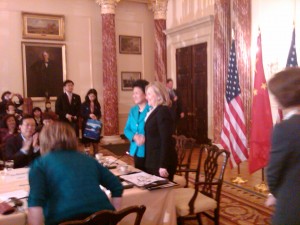by Cathy Barbash
The new maturity of the relationship between the U.S. and China was evident earlier this week as the 2011 U.S.-China High-Level Consultation on People-to-People Exchange (CPE) meetings went forward despite both the U.S. Embassy in Beijing’s calling for the release of superstar artist Ai Weiwei and planning difficulties resulting from the possible U.S. government shut-down.
The two-day event included an opening plenary co-led by CPE Coordinators Under Secretary of State for Education and Cultural Affairs Judith McHale and Vice Minister of Education Hao Ping, followed by break-out working group sessions in culture, education, science and technology and sports. McHale’s opening remarks indeed alluded to the situation, stating; “…But when human rights activists and intellectuals and artists fear arbitrary arrest or forced detention, or when education and cultural programs are abruptly canceled as a sign of displeasure, that good faith is undermined, and all the positive momentum our nations have built is slowed.”
Once the official remarks were over however, both sides got down to work in day-long very people-to-people, face to face meetings. The Culture Working Group divided their efforts into three sessions, including an overview of U.S. and Chinese government supported programs, U.S. and Chinese Development Programs for Museum and Library Professionals, and U.S. Private Sector Initiatives with China. In addition to U.S. governmental cultural institutions (Smithsonian, NEA, NEH, IMLS, ECA’s Dance Motion, etc.), presenters included The Philadelphia Orchestra, The Kennedy Center for the Performing Arts, the Asia Society, the American Association of Museums and, most unexpectedly, Rodeo China. The findings were reported to Hillary Rodham Clinton and Chinese State Councilor Liu Yandong the next day in a formal public meeting at the State Department. I will follow the development of the proposed projects in future posts.
an overview of U.S. and Chinese government supported programs, U.S. and Chinese Development Programs for Museum and Library Professionals, and U.S. Private Sector Initiatives with China. In addition to U.S. governmental cultural institutions (Smithsonian, NEA, NEH, IMLS, ECA’s Dance Motion, etc.), presenters included The Philadelphia Orchestra, The Kennedy Center for the Performing Arts, the Asia Society, the American Association of Museums and, most unexpectedly, Rodeo China. The findings were reported to Hillary Rodham Clinton and Chinese State Councilor Liu Yandong the next day in a formal public meeting at the State Department. I will follow the development of the proposed projects in future posts.